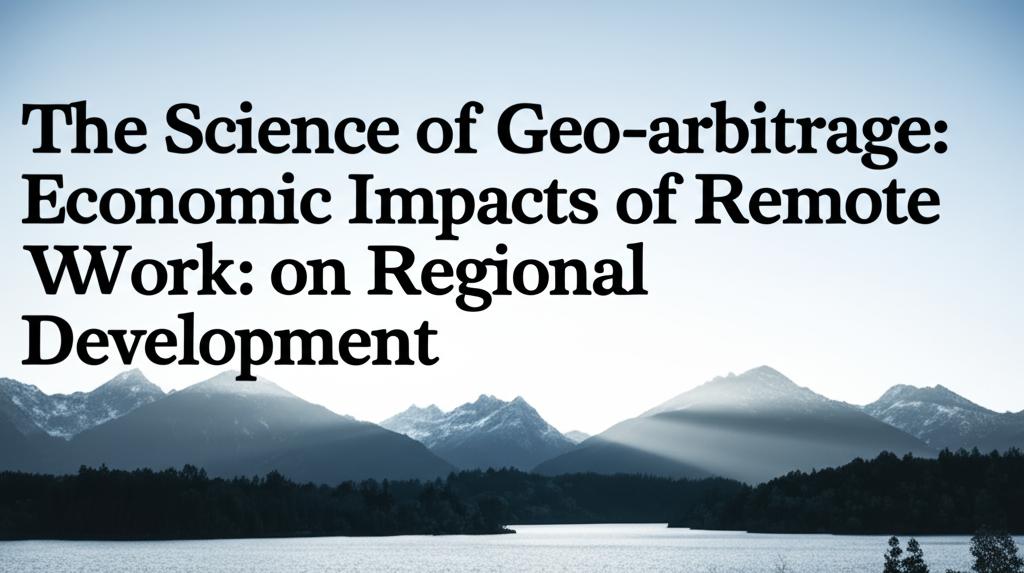The rise of remote work, accelerated significantly by the COVID-19 pandemic, has introduced a phenomenon known as "geo-arbitrage," where individuals leverage income earned in a higher-cost area while living in a lower-cost one. This trend is creating substantial economic shifts with notable impacts on regional development.
Shifting Economic Activity and Housing Markets:A primary consequence of geo-arbitrage is the movement of economic activity from large urban centers to suburban and rural areas. As remote work becomes a permanent fixture for many, a significant volume of retail and hospitality spending is shifting away from major city centers. This can lead to job losses in local services within these urban cores and potentially exacerbate labor market inequality.
Conversely, this migration is fueling demand in housing markets outside of traditional economic hubs. Remote workers, often with higher earning power, are increasingly seeking larger homes, more space, and a perceived better quality of life in less expensive regions. This has led to rapid price increases in housing in these "destination" areas, including smaller markets, rural locations, and lower-density counties within large metro areas. While this benefits incoming remote workers, it can decrease housing affordability for existing residents. States and regions previously less attractive are now seeing increased interest from home builders and buyers alike.
Impact on Urban Centers:Urban areas are experiencing a transformation in their commercial real estate landscape. Decreased demand for large office buildings has resulted in lower rental prices and higher vacancy rates, prompting a reimagining of these spaces. Local businesses in cities, such as restaurants and retail stores that once relied heavily on office worker patronage, have seen reduced foot traffic, necessitating shifts in their business models towards online sales and delivery. The rental market in urban areas has also been affected, with some tenants seeking more affordable options or relocating for more space.
Stimulation of Rural and Suburban Economies:The influx of remote workers into rural and suburban areas is stimulating local economies. These new residents bring increased spending power, benefiting local businesses and services. This economic injection can lead to job creation and the revitalization of these communities. To accommodate this growth, there's an observable surge in infrastructure development, including improved internet connectivity, enhanced transportation networks, and the establishment of co-working spaces.
Labor Market Adjustments:The rise of remote work is also influencing the job market. There's an increased demand for roles that can be performed remotely. For businesses, this means access to a broader and more diverse talent pool. For individuals, particularly in developing countries or lower-cost regions, remote work for international companies can lead to significantly higher earnings, allowing them to inject these earnings back into their local economies. This "e-migration" allows professionals to contribute to global initiatives without leaving their communities, fostering local growth and developing tech talent ecosystems.
Challenges and Considerations:While geo-arbitrage and remote work offer opportunities for regional development, they also present challenges. The rapid influx of new residents into certain areas can strain existing infrastructure and services. Rising housing costs can create affordability issues for long-term residents. There's also a potential for a "brain drain" in some areas if local talent primarily serves remote companies without sufficient local reinvestment.
Furthermore, the long-term sustainability of the digital nomad lifestyle, a subset of remote work, can be impacted by factors like securing suitable accommodation, co-working spaces, and navigating legal and personal connection challenges.
Policy Implications:These shifts necessitate strategic policy responses. For urban areas, this may involve re-evaluating city planning and economic strategies to adapt to reduced office occupancy and changing retail landscapes. For burgeoning remote work hubs, investment in digital and physical infrastructure is crucial. Policies that encourage the integration of new and existing residents and manage housing affordability will be important. Governments can also play a role in fostering environments that attract and retain remote workers while ensuring benefits are shared within the community.
In conclusion, the science of geo-arbitrage, driven by the proliferation of remote work, is a powerful force reshaping regional economies. It presents both significant opportunities for growth and revitalization in some areas and considerable challenges for others. Understanding these dynamic impacts is crucial for individuals, businesses, and policymakers navigating this evolving economic landscape.

